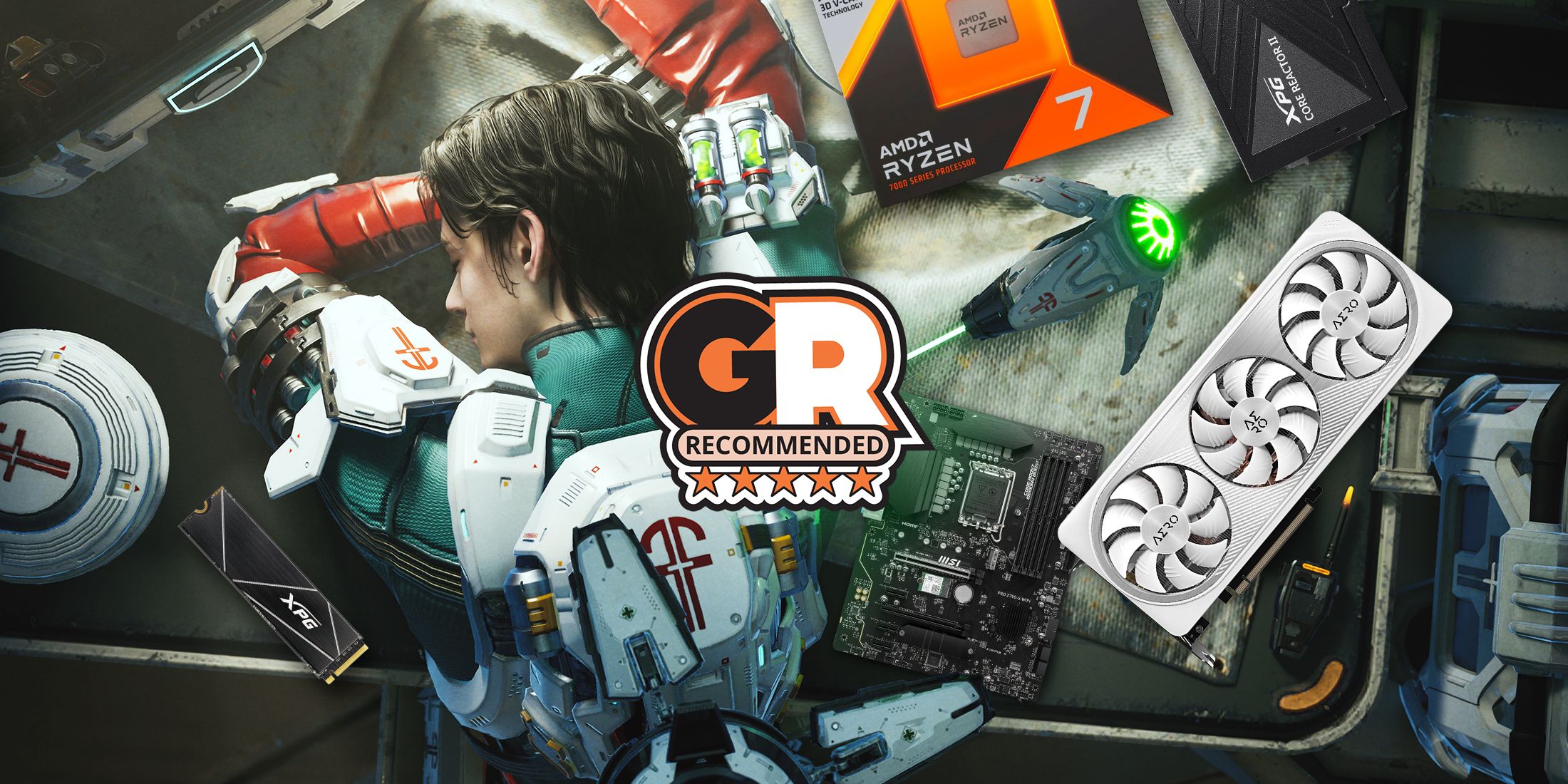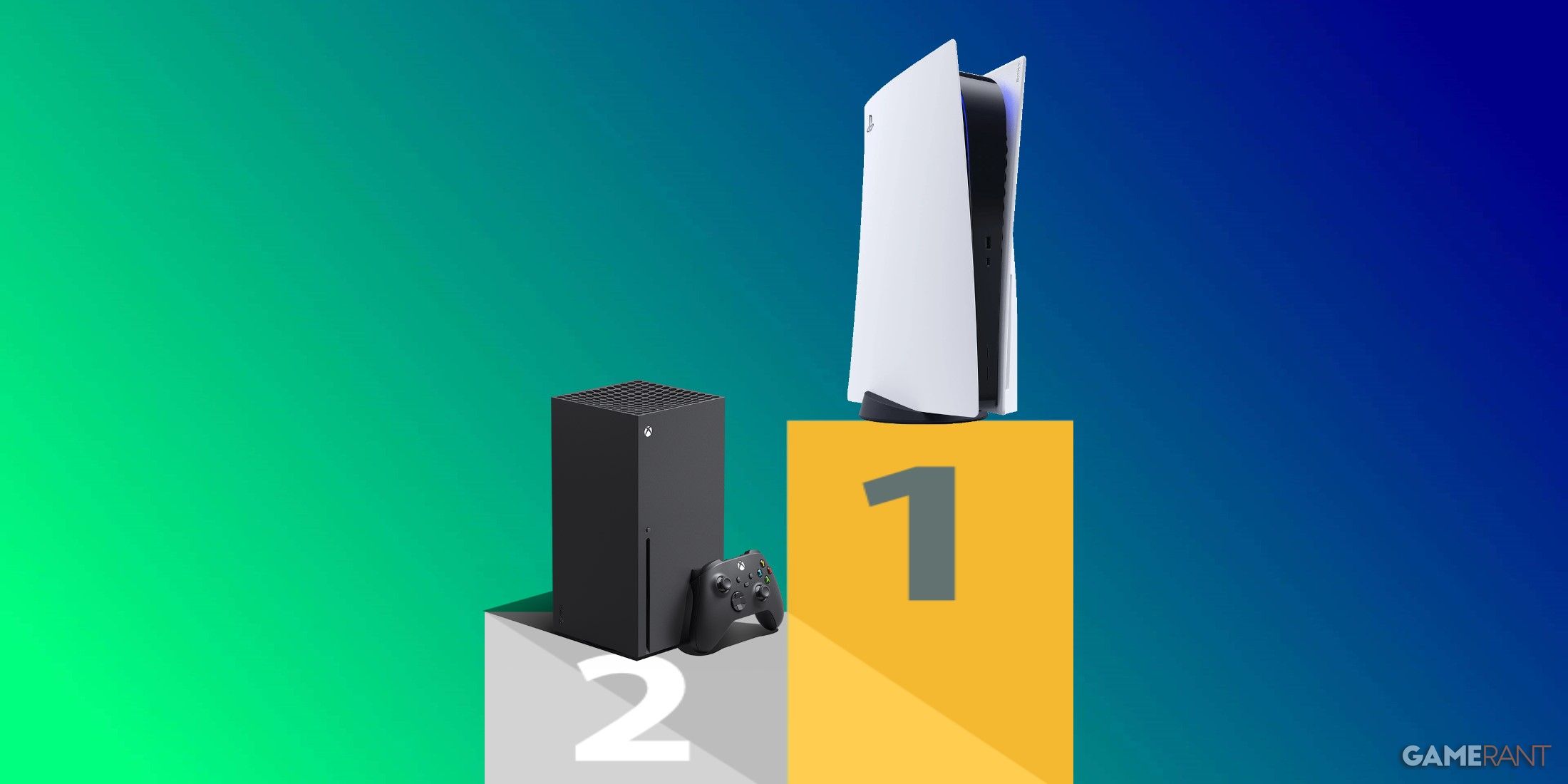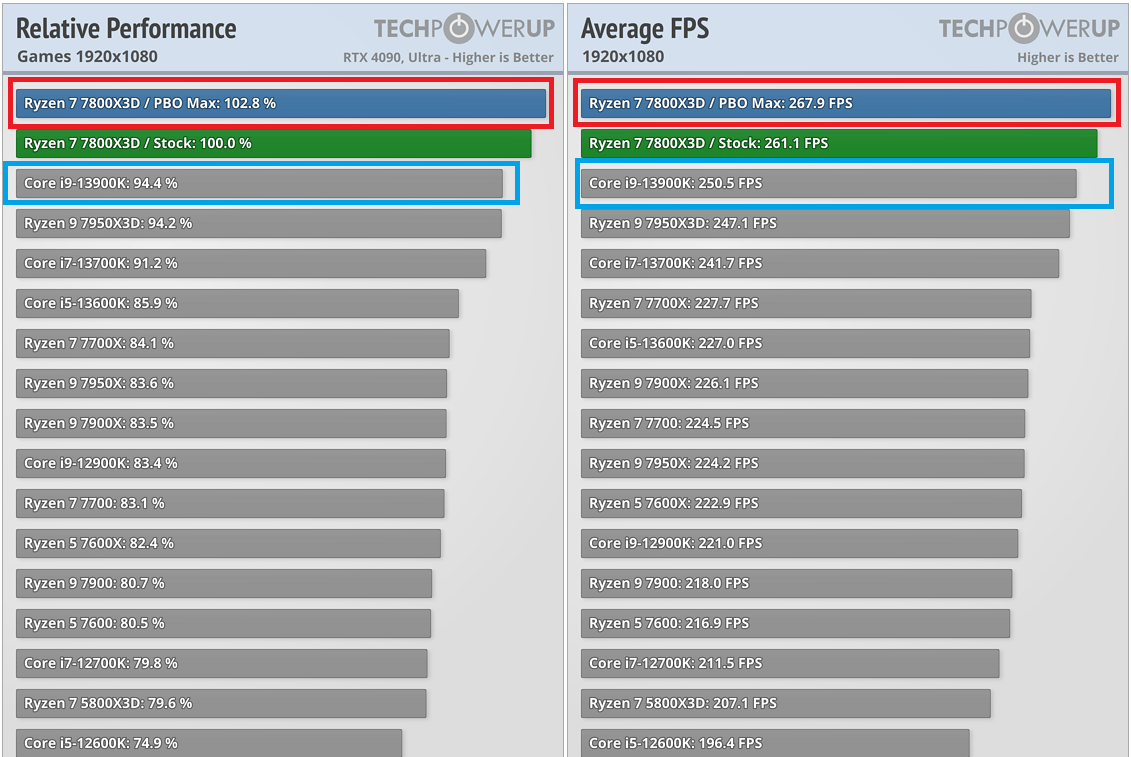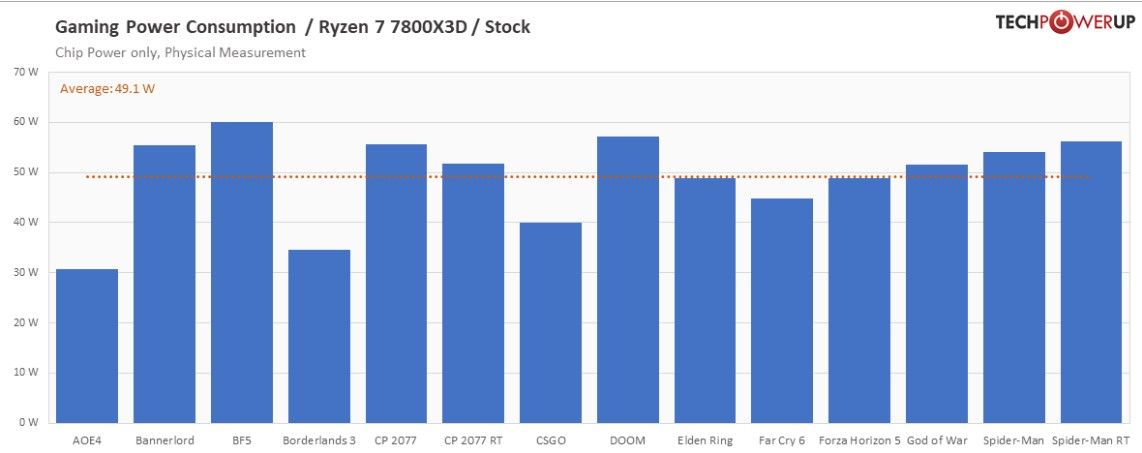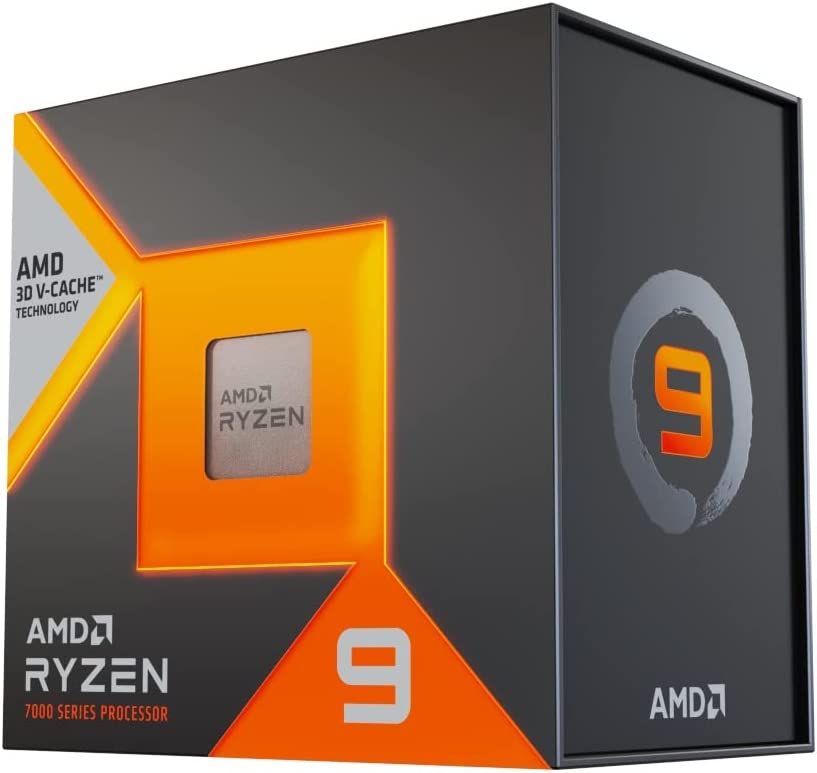-
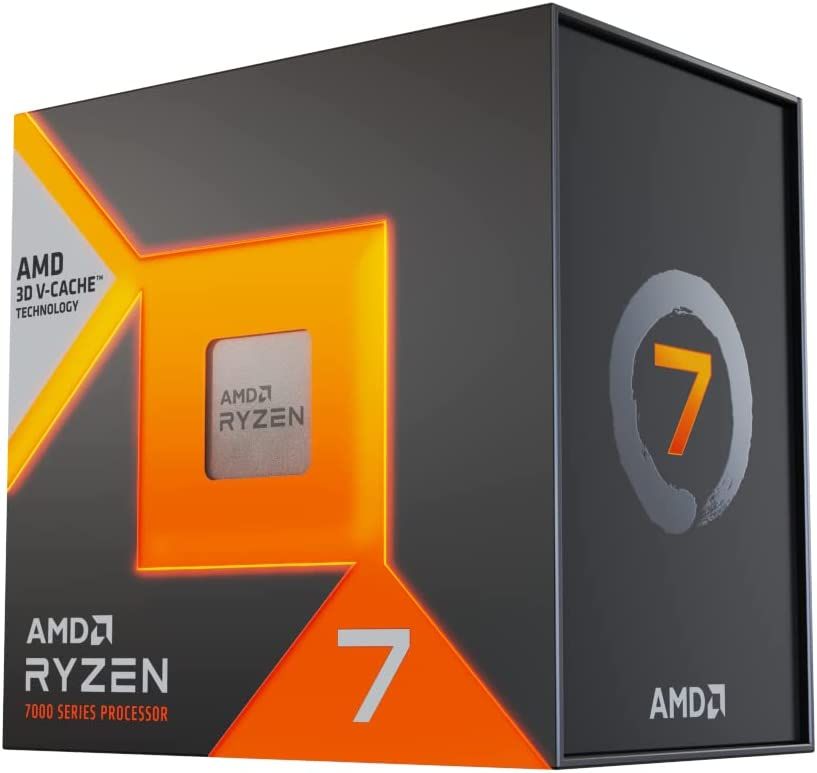
AMD Ryzen 7 7800X3D
The AMD Ryzen 7 7800X3D is AMD's latest and greatest CPU when it comes to gaming. With an excellent and highly efficient gaming performance that tops the charts currently, the Ryzen 7 7800X3D is here to stay and has a crown to claim thanks to its 3D V-Cache-enabled prowess when it comes to gaming on a PC.
The octa-core CPU currently happens to be the fastest in the business for gaming even as it leads efficiency charts at the top, making it a very sought-after gaming upgrade. -
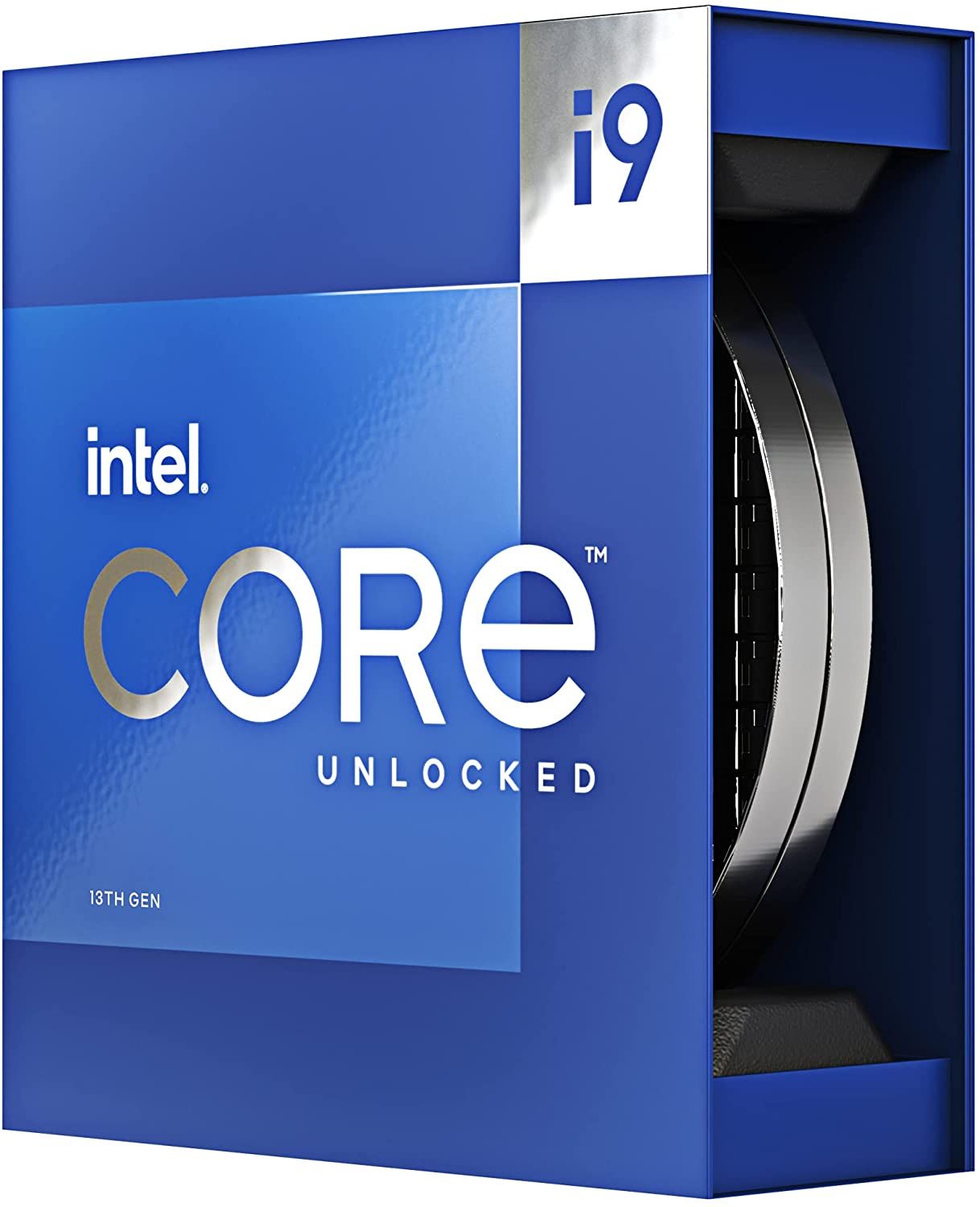
Core i9 13900K
$580 $630 Save $50The Intel Core i9 is Intel's 13th generation Raptor Lake flagship processor. It promises exceptional gaming performance in addition to excellent benchmark results for a wide slew of tasks. The 24-core, 32-thread processor tends to handle these with ease while offering PCI-E 4.0/5.0 compatibility with the 700 series motherboards it works with in addition to working with 12th generation motherboards which share the same socket.
AMD's Ryzen 7 7800X3D is AMD's latest foray into the performance processor market. Unlike its more core-heavy siblings, the 7900X3D and the 7950X3D, this is a single CCD design-based processor that focuses exclusively on gaming from the get-go as it delivers outstanding value, performance, and efficiency in a neat package that will compel you to give the AM5 socket a second glance and then some.
Intel's 13th generation processors comprehensively beat AMD's 7000 series Ryzen processors at launch in terms of gaming and raw performance even if efficiency was a sore point. However, with the advent of the Ryzen 7 7800X3D, we might have a CPU that takes the gaming crown from Intel's 13900K processor without costing more than it was at launch.
While the AMD Ryzen 9 7950X3D does already beat Intel's 13th generation's top tier Intel Core i9-13900KS comprehensively when it comes to gaming and some productivity tasks, it does currently cost more than the latter at currently available market prices. This situation however, is completely reversed when it comes to the 8 Core, 16 thread Ryzen 7 7800X3D taking on a much bigger 24 core, 32 thread Intel Core i9 13900K for gaming even if it can't hold a candle to it when it comes to productivity applications with a third of the cores that the Intel chip has.
Head-To-Head Comparison
AMD is on a roll of late as it pushes its 3D V-Cache-enabled processors to the top of the Zen 4 pile in a bid to even the odds against Intel, which that dominated the market for most of the last two years with the single exception of the extremely potent Ryzen 7 5800X3D. AMD is looking to recreate its success across all 3 of its major AMD Ryzen 7000 X3D Processors and position the higher-end duo for creators and enthusiasts. While the Ryzen 7 7800X3D is expected to directly hurt Intel's prior market dominance when it comes to processors for gaming thanks to higher clocks and more cores in some of their highest end offerings.
The Ryzen 7 7800X3D is a capable gaming juggernaut that puts all of its cores and the generous 3D V-Cache serving to excellent use in order to make the most of the single CCD-based octa-core processor, and it does not disappoint. The AMD Ryzen 7 7800X3D essentially dominates all major gaming charts, trading blows with or going neck to neck with its higher-end Ryzen 9 7950X3D sibling at the top but generally coming out on top.
Pushing a sub-50W power draw makes the 7800X3D an even more appealing proposition versus the sub-150W of power the i9 13900K can consume while gaming, pushing closer to 250W when using productivity-based applications. This translates to the requirement of having adequate cooling in a system too. With a TDP that is double the competing 7800X3D, the Intel Core i9 13900K will have much more stringent cooling needs than AMD's much more efficient offering.
Intel's 13th generation Core i9 13900K is hardly a new player in the CPU market, having been in play since the 2nd half of 2022. The 24-core, 32-thread CPU is one of the most powerful in the market and comes with massive power draw and thermal needs in tow to sustain its number-crunching abilities. It builds onto the success of the Core i9-12900K, adding 8 more efficiency cores and increasing its boost clocks significantly higher to push as much as 5.8GHz if provided the right conditions. It does comprehensively beat AMD's Ryzen 9 7950X offering prior to the X3D refresh quite handily in both games and productivity applications thanks to it having 8 extra efficiency cores in tow with its potent performance core setup.
What is a number-crunching juggernaut by Intel that has proved quite popular with enthusiasts and gamers alike seems to be facing off against much more potent competition this time around, however. AMD has aggressively priced the octa-core Ryzen 7 7800X3D to carve a large chunk of the Intel Core i7 13700K and 13900K's market share with a product priced near the former which outperforms the latter in gaming with ease.
That is not to say that Intel's offerings are toothless given AMD's recent product launches. The Santa Clara, CA-based chipmaker has historically responded to AMD's new product offerings with a price cut that pushes its processors into more competitive market positions. That is not to say that AMD will not respond in kind with a price cut as it looks to give both the 7900X3D and the 7950X3D better footing in a market where they face stiff competition not only from Intel's offerings but also from their latest processor, the Ryzen 7 7800X3D.
Gaming Benchmarks
Much like AMD's 16-core, 32-thread Ryzen 9 7950X3D, the 8-core, 16 thread Ryzen 7 7800X3D is an excellent processor for gaming, often beating and occasionally leveling with the 16-core behemoth with ease. It does extend a comprehensive lead over Intel's 13900K Processor, beating it with ease in a multitude of games tested in 1080P, 1440P as well as 4K. While Intel's processor does come out ahead in games that harness the power of multicore processors better, extending a lead in titles such as Counter-Strike: Global Offensive & Age of the Empires IV, it cedes much more space in other titles overall, making it a far less palatable gaming processor than its octa-core rival that wins more than it looses in most of the games being tested.
The Ryzen 7 7800X3D beats even its more expensive AMD sibling comprehensively when it comes to gaming benchmarks at FHD resolutions with the Intel Core i9 13900K trailing behind at a distant 3rd position if we disregard stock clocks for the 7800X3D. This exhibits something that AMD has already shown in its benchmarks: significant leads for most of the titles in the market and while the 7950X3D's benchmarked leads versus Intel's 13900K (and 13900KS) were less worrying given the price point it pushed, the 7800X3D is a different beast altogether, as it outperforms its own more expensive sibling and Intel's best-in-class processors. (Benchmark Source: Techpowerup)
Efficiency & Thermals
Efficiency is a different yardstick altogether as the Ryzen 7 7800X3D completely decimates the competition from Intel and does so at just under 50 watts of power on average at stock settings, a far cry from its own rated TDP of 120 W. In comparison, the Intel 13900K regularly pushes power demands of 140-150W for most of the games it runs, making it a fairly uneven race from the start.
Productivity numbers are similar again, with the 7800X3D pushing the same power consumption, but less reliably; The 13900K does comprehensively beat the 7800X3D in most of the productivity applications they test for. A fairer look here would be at the efficiency of the AMD Ryzen 9 7950X3D versus the Intel Core i9 13900K/KS as these run much closer to each other in terms of benchmarking capacity.
While the AMD Ryzen 7 7800X3D does cross 50W in some games, it does stay at approximately under 50W for most of the games tested on average. This makes it one of the most efficient gaming processors currently available in the market. The story remains more or less similar for productivity-related tasks for the octa-core processor. (Benchmark Source: Techpowerup)
Thermally, AMD's 7800X3D tends to be superior to the Core i9 13900K given its limited heat generation capacity, but it does prove to be a bigger challenge to cool than the AMD Ryzen 7 7700X, even with some of the best coolers in the market. This is partially because of AMD's singular CCD, which is concentrated in a very tiny area of the chip, and also the 7nm 3D V-cache that is stacked on top of the CCD. It also has a tighter TJMax (maximum temperature before the CPU starts to throttle) to avoid damaging the CPU's extended cache at 89 degrees Celsius.
The processor, when under load from productivity applications quickly pushes to sub-80 degree temperatures and stays there with PBO tuning pushing it even closer to the brink of its thermal limits. However, while gaming, it remains a cool customer, oscillating between 60 and 75 degrees depending on the game being played and the extent to which the CPU is stressed with a 240MM Lian Li Galahad Cooler (which is slightly under AMD's own 280 mm cooler recommendations if one is a stickler) but does an excellent job compared to the competition in general, especially when compared to 13th generation processors.
Value Proposition
Value for money is where the Ryzen 7 7800X3D really shines, with an impressive $449 MSRP essentially making it a no-brainer for gaming. But there are multiple caveats here that must be considered which do seem to push the 13900K higher, and considerably so. Firstly, while gaming is the 7800X3D's primary concern, processors such as the 7950X/7950X3D and the Intel Core i7 13700K and the 13900K pull ahead in a massive way when it comes to productivity applications. This is primarily due to the 7800X3D's limited core count; the processor is limited to 8 cores and 16 threads which is an excellent combination for gaming, but lackluster when it comes to productivity applications that can be more demanding and utilize multicore performance better.
At the same time, while the Ryzen 7 7800X3D does excel in gaming and is an easy recommendation at MSRP, it is not available for this at various retailers thanks to it selling out ASAP - and 3rd party vendors are demanding as much as $1000-1100 for it on marketplaces, making it considerably worse than even the higher end Ryzen 9 7950X3D in terms of both, absolute cost and actual value for money.
The Ryzen 9 7950X3D is an interesting choice given the current price point the Ryzen 7 7800X3D, is currently trading for as the undisputed gaming king and thanks to its higher core count and second CCD. It should emerge as a clear favorite for content creators looking to go AMD for their next-generation builds. It is within spitting distance of the 24-Core Intel Core i9 13900K for productivity tasks. It also happens to be much more efficient than the competition from Intel, making it an excellent gaming plus content creation choice with it coming a close second in gaming benchmarks and close enough for comfort on productivity application performance.
Ryzen 7 7800X3D is the choice for pure gamers
All in all, the Ryzen 7 7800X3D is undoubtedly a faster performer when it comes to gaming in general. It also commands better value for gamers. There is however a reason why AMD markets the 7950X3D for creators and gamers and the 7800X3D for gamers only; The performance of The Ryzen 7 7800X3D is equivalent to, and sometimes slower than the Ryzen 7 7700X in productivity applications due to its core count and limited overclockability than AMD's much cheaper non-X3D offering. If you plan to game purely, the Ryzen 7 7800X3D should be your weapon of choice. If you plan to engage in productivity and game, the Ryzen 9 7950X3D edges considerably higher and if you want to lean towards productivity as a primary concern, the Intel Core i9 13900K's value proposition as a 24-core processor is hard to deny.
If you plan to go the Ryzen 7 7800X3D route, you would also need a compatible motherboard that allows you to get the best possible performance from the system. AMD's EXPO-compliant RAMs are also key to unlocking additional performance with the Ryzen 7000 series processors, and the X3D processors to a lesser extent, and it would help you to check out our dedicated guide on memory choices for AMD's latest and greatest gaming CPU.
FAQ:
Q: What is the fastest CPU for gaming currently?
A: The AMD Ryzen 7 7800X3D is currently the fastest CPU for gaming in the market.
Q: How many cores and threads does a Ryzen 7 7800X3D have?
A: The Ryzen 7 7800X3D has 8 cores and 16 threads as part of its processor package.


